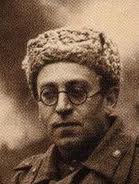Vasily Grossman, a Jew, was a great Soviet war correspondent in WWII. His war journalism, recently published as A Writer At War, is simply superb. An example describes people fleeing the Nazi invasion:
“This isn’t a flood, this isn’t a river, it’s the slow movement of a flowing ocean, this flow is hundreds of meters wide. Children’s heads, fair and dark, are looking out from under the improvised tents covering the carts, as well as the biblical beards of Jewish elders, shawls of peasant women, hats of Ukrainian uncles, and the black-haired heads of Jewish girls and women. What silence is in their eyes, what wise sorrow, what sensation of fate, of a universal catastrophe!”
In response to post-World War II Soviet anti-Semitism, Grossman became a dissident. He wrote two novels, his massive fictional masterpiece, Life and Fate (whose centerpiece is the Battle of Stalingrad), and the smaller, but equally superb Everything Flows. Though Grossman was not imprisoned, his novels were suppressed. In response, Grossman bravely wrote to Khrushchev: “What is the point of me being physically free when the book I dedicated my life to is arrested . . . . I am not renouncing it. . . . I am requesting freedom for my book.” Dissidents (including Sakhorov) helped smuggle the manuscripts to the West, where they were published (but only after Grossman’s death).
Even amid the salted field that is the literary world of the last several decades, Grossman’s writing is one of the occasional flowers that poke through. Grossman combined his real-life experiences with other imagined ones to create his massive fictional masterpiece, Life and Fate. The Soviets tried to suppress the novel. But for some good luck, all manuscripts of the novel would have been destroyed, and the world would have been denied a masterwork.
Grossman’s mother was murdered by the Nazis in a death camp (and he always felt guilty because he was powerless to rescue her before the Germans overran her home town). In what may have been an act of penance, Grossman creates a longish set piece within Life and Fate in which an unmarried, middle-aged female doctor, Sofya, and all of her fellow Jews in their small Ukrainian town are first surrounded and confined, and then later herded onto a train bound for a death camp. During the horrific journey, a young boy, David, is abandoned by his frivolous, selfish aunt and Sofya assumes responsibility for him. As they arrive at the camp, most are sent to the “showers,” including Sofya and David. Sofya knows that if she identifies herself as a doctor she will likely be spared, at least for a time. But she refuses to abandon David to a terrifying, lonely death. As they are pushed into the gas chamber, Sofya keeps a tight grip on David’s hand so they will not be separated. Then, as the gas enters the sealed room, Sofya holds and comforts David:
“All this time David was being clasped by strong warm hands. He didn’t feel his eyes go dark, his heart become empty, his mind grow dull and blind. He had been killed; he no longer existed.
Sofya Levinton felt the boy’s body subside in her arms. Once again she had fallen behind him. In mine-shafts where the air becomes poisoned, it is always the little creatures, the birds and mice, that die first. This boy, with his slight, bird-like body, had left before her.
‘I’ve become a mother,’ she thought.
That was her last thought.”
Nothing here is contrived, yet it is intensely emotional. The reader is not manipulated. There is no overwrought language or sentimentality. There is just the straightforward recounting of a courageous, human act of love—an act, in the midst of unimaginable horror, that qualifies Sofya to be called a “mother.” Of all the scenes in all the hundreds of novels I have read, this scene stirs my soul the most—and it teaches a great truth about the sanctity of woman’s greatest role.
Grossman was a brave man who witnessed and suffered from Nazi and Soviet totalitarianism. Perhaps his greatest words in opposition to totalitarianism are these from Everything Flows (about the Gulag): “[T]here is no higher happiness than to leave the camp, even blind and legless, to creep out of the camp on one’s stomach and die—even if only ten yards from that accursed barbed wire.” His message: man must be allowed to live and die free. Freedom is beginning of all other rights.
